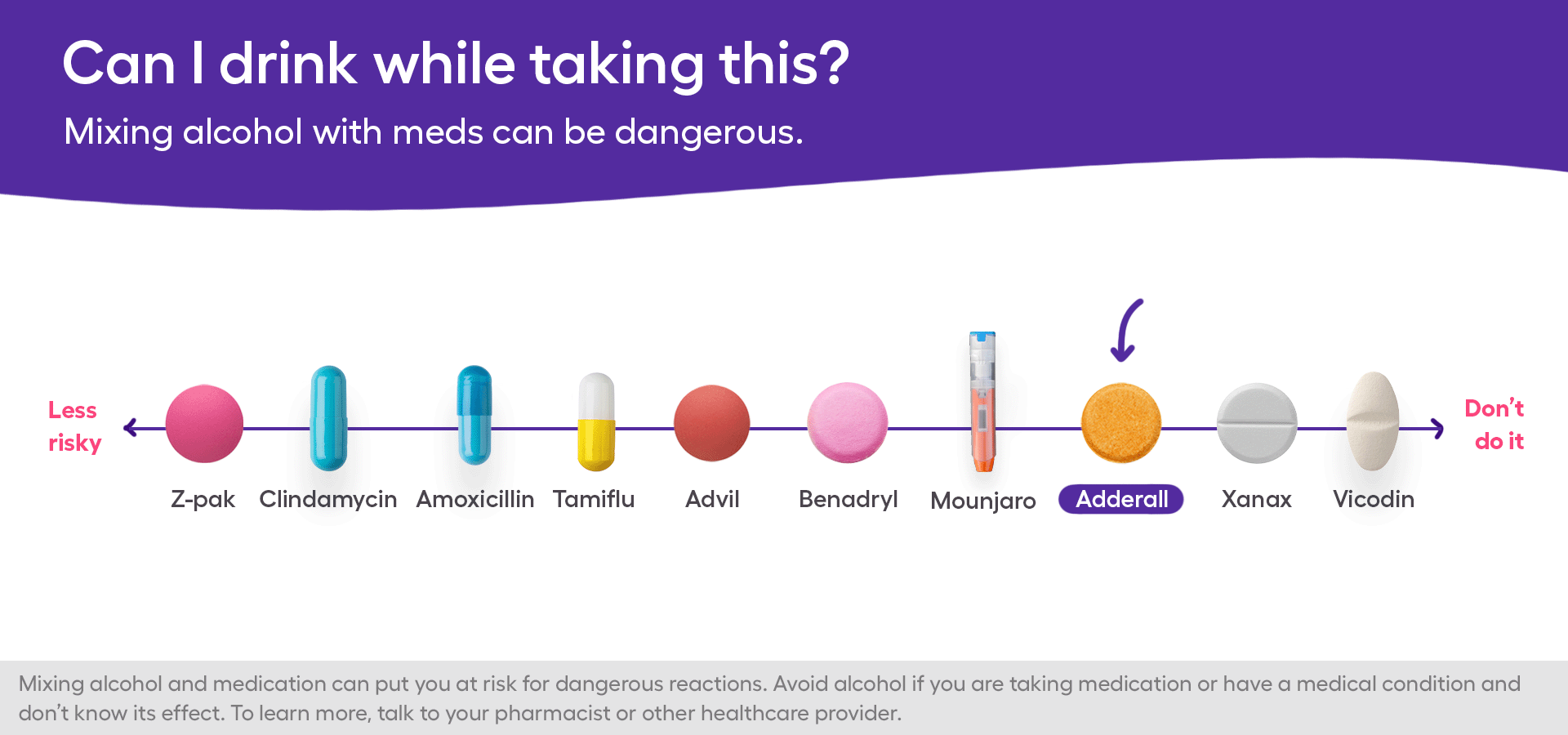Adderall is a prescription medication that contains amphetamine and dextroamphetamine. It works as a central nervous system (CNS) stimulant that increases the levels of certain neurotransmitters in the brain. Adderall is FDA approved as an ADHD medication that can help improve symptoms such as inattention and impulsivity. Due to its effects on promoting wakefulness and alertness, Adderall can also be used to treat narcolepsy. Mixing Adderall and alcohol is a common concern for people who are living with attention deficit hyperactivity disorder (ADHD). Although it’s one of the most prescribed drugs for ADHD, Adderall is also one of the most misused and abused prescription drugs in the United States. Many people, from college students to working professionals, experiment with Adderall as a study drug or performance enhancer.
But what happens if you mix Adderall and alcohol? Because Adderall is prescribed for daily use, it’s likely at some point, an alcoholic beverage will come into play. Combining Adderall and alcohol can be dangerous, potentially leading to an overdose or heart problems. In addition, drinking alcohol could worsen ADHD symptoms and lead to an increased risk of alcohol use disorder. Keep reading to learn more about this dangerous combination.
Can you mix Adderall and alcohol?
Mixing Adderall and alcohol is not recommended. Combining the two could increase the risk of serious side effects and adverse reactions. Adderall is a stimulant that can increase alertness and focus. On the other hand, while alcohol may have stimulant effects in small doses, it is considered a depressant that can slow down brain activity and cause drowsiness. As a result, Adderall and alcohol have opposing effects, which can lead to decreased effects of Adderall.
Adderall can also mask the effects of alcohol, potentially causing a person to drink more alcohol than intended. Drinking too much alcohol while taking Adderall could lead to an increased risk of alcohol poisoning and other physical or mental problems. Mixing the two could be especially dangerous in people with other health conditions, such as heart disease or bipolar disorder.

Adderall and alcohol side effects
Adderall and alcohol may cause side effects that range from mild to severe. The severity of side effects can vary depending on the dosage of Adderall and how much alcohol is consumed. Other factors such as age, weight, and overall health can also play a role.
Some of the most common side effects of combining Adderall and alcohol include:
- Increased heart rate
- High blood pressure
- Elevated body temperature
- Aggression or hostility
- Agitation or irritability
- Manic behaviors
- Impaired judgment
- Insomnia or difficulty sleeping
- Headache and blurred vision
- Increased risk of seizures
Adderall may cause severe heart-related problems, including strokes and heart attacks, especially in people with a history of cardiovascular disease or high blood pressure. Along the same lines, heavy alcohol use over time is linked to various health conditions, including high blood pressure and heart failure.
Adderall may also cause mental or psychiatric problems, including worsened symptoms of bipolar disorder and psychosis. Alcohol-related psychosis is possible with short-term or long-term consumption of alcohol. Drinking alcohol with Adderall may increase the risk of psychotic symptoms, such as hallucinations, delusions, and suspicious thoughts.
Drinking alcohol with Adderall may also increase the risk of serotonin syndrome, as Adderall and alcohol can increase the levels of serotonin in the brain. Serotonin syndrome is a potentially life-threatening condition that can cause agitation, rapid heart rate, confusion, and other symptoms.
What to do if you mix Adderall and alcohol
If you accidentally mix Adderall and alcohol and experience any serious side effects, it’s important to seek medical attention immediately. Depending on the severity of your symptoms, you may need to be hospitalized or treated by a healthcare provider.
In general, the best way to avoid the risks of mixing Adderall and alcohol is to not drink alcohol while taking Adderall. If you do choose to drink, it’s important to do so in moderation. Talk to your healthcare provider about the potential risks or interactions between Adderall and alcohol.
If you experience any signs or symptoms of alcohol poisoning or an Adderall overdose, seek immediate medical attention. Symptoms of alcohol poisoning may include:
- Confusion
- Vomiting
- Seizures
- Pale skin
- Low body temperature (hypothermia)
- Abnormal or slow breathing
- Severe drowsiness or unconsciousness
If left untreated, alcohol poisoning may lead to coma, brain damage, and death.
How much alcohol can you drink while taking Adderall?
Although it’s best to avoid alcohol while taking Adderall, you may find yourself drinking alcohol during Adderall treatment at some point. To avoid the potential risk of increased side effects, you’ll want to extend the time between taking an Adderall dose and drinking alcohol as much as possible.
The effects of Adderall IR tablets generally last four to six hours, while the effects of the ER capsules can last for up to 12 hours. For these reasons, the safest time to consume alcohol would be close to the time when the drug’s effects are wearing off. Doing so may reduce the risk of overlapping effects of the drug and alcohol.
As always, it’s important to drink in moderation—whether you’re taking Adderall or not. Drinking in moderation is defined as no more than one drink per day for women and no more than two drinks per day for men. Consult your healthcare provider if you have any questions or concerns about how much you may be able to drink while taking Adderall.
Alcohol and other stimulants
Mixing alcohol with stimulant ideas can pose a significant health risk. Over-the-counter stimulants and prescription stimulants can all increase blood pressure and heart rate.
Examples of other stimulant drugs include:
- Caffeine
- Nicotine
- Sudafed (pseudoephedrine)
- Dexedrine (dextroamphetamine)
- Ritalin (methylphenidate)
- Adipex-P (phentermine)
Drinking alcohol can amplify the stimulant effects of these medications, which could lead to dangerously high blood pressure and heart problems.
Increased CNS stimulation can cause increased activity and high body temperature, which may increase the risk of dehydration. Alcohol has diuretic effects, which means it causes the body to get rid of excess fluids through the urine. These diuretic effects may compound the dehydrating effects of stimulants.
Another important aspect of mixing alcohol and stimulants to be aware of is the risk of dependence. Stimulant medications can be habit-forming, especially when taken in higher doses or for longer periods than prescribed. Long-term use of stimulants may lead to physical or psychological dependence, which may result in withdrawal symptoms if the medication is abruptly stopped.
Alcohol is also a substance that can be habit-forming. Excessive use of alcohol can lead to dependence and addiction, as well as a range of physical and mental health problems over time. Regular or excessive alcohol consumption can also increase the risk of liver disease, high blood pressure, and heart disease. Mental health problems caused by alcohol may include depression and anxiety.
Alcohol and ADHD
Adderall use and the risk of alcohol use disorder are closely linked. In some cases, a healthcare provider may be treating both ADHD and alcohol use disorder simultaneously.
Research shows that up to 43% of people with ADHD develop an alcohol use disorder. On the other side, around 20% of people with alcohol use disorder develop ADHD. Other studies have shown that the overall prevalence of alcohol or substance use disorder is high in people with ADHD.
Alcohol abuse can have different effects on ADHD and worsen symptoms like increased impulsivity, trouble focusing, and behavioral issues. In young adults with ADHD, worsened ADHD symptoms can negatively affect academic performance and social skills.
Treatment options for alcohol and Adderall abuse
The dangers of mixing Adderall and alcohol can be serious in people with a history of Adderall abuse or another substance use disorder. It’s a good idea to understand the risks involved and take steps to prevent serious side effects from mixing the two. If you or a loved one is struggling with Adderall addiction, it’s important to seek professional medical advice.
Addiction treatment centers offer personalized treatment plans that can help people detox and recover based on their needs. A personalized plan may include detoxification, counseling, medication-assisted treatment, and help through support groups. Choosing a reputable, experienced treatment center may help improve the chances of a successful recovery.
Support from family and friends can also be an important aspect of treatment. If you’re worried about a loved one dealing with substance abuse, being understanding and compassionate can influence the success of treatment. You can make a difference by encouraging them to seek professional help and offering support.
Bottom line
The results of mixing alcohol and Adderall can be unpredictable and dangerous. Alcohol can worsen the side effects of Adderall, such as an increased heart rate and high blood pressure. Adderall can also mask the effects of alcohol, increasing the risk of alcohol poisoning.
Alcohol can worsen some ADHD symptoms, such as impulsivity and aggression. In addition, people with ADHD may be more likely to develop an alcohol use disorder, especially if alcohol is consumed in large amounts over time. Therefore, it’s best to be cautious about drinking alcohol with ADHD, whether a medication like Adderall is being taken or not.











